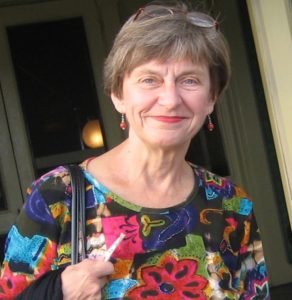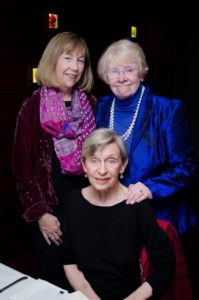Carol Anderson MSW, PhD. (1939-2014) was a great and loyal friend of our Institute from the beginning, presenting workshops and consulting with us as well as participating many times in our Culture Conference over the years. Shy, brilliant, and creative, she was one of the most consistent contributors to the Family Therapy field. She never hesitated to offer her warm and thoughtful ideas on every sort of issue as the years went by. We want to share with you some of our favorite lines from and about her. The following are quotes from Carol’s extraordinary writings that we have found both challenging and inspiring.
QUOTES FROM OUR NETWORK ABOUT CAROL ANDERSON
 Paulette Moore Hines: “I met Carol at the Stonehenge Conference . . . She quickly became a role model and person that I greatly admired. Carol was brilliant, creative, multi-talented, and so very humble. She always seemed surprised when I reminded her how much she contributed to my early interest in AFTA and family therapy and, in particular, how much I still value and reference her book on Mastering Resistance. Moreover, Carol was a warm, genuine, caring person. We had an ongoing exchange about her love of ‘crazy socks’ which she occasionally punctuated by shipping me a pair. She holds a special place in my heart and memory. The world is a better place because Carol touched our lives in so many ways.”
Paulette Moore Hines: “I met Carol at the Stonehenge Conference . . . She quickly became a role model and person that I greatly admired. Carol was brilliant, creative, multi-talented, and so very humble. She always seemed surprised when I reminded her how much she contributed to my early interest in AFTA and family therapy and, in particular, how much I still value and reference her book on Mastering Resistance. Moreover, Carol was a warm, genuine, caring person. We had an ongoing exchange about her love of ‘crazy socks’ which she occasionally punctuated by shipping me a pair. She holds a special place in my heart and memory. The world is a better place because Carol touched our lives in so many ways.”
Nydia Garcia Preto: “Carol Anderson’s brilliance and humor were reflected in her beautiful blue eyes, especially when she smiled and engaged in conversation. She was sensitive, curious, and committed to making this a better world. Early in my career as a family therapist I found her book, Mastering Resistance: A Practical Guide to Family Therapy to be as invaluable as the Spanish/ English dictionary I carried around with me in the 7th grade, when I first arrived from Puerto Rico and could not speak English. Later, hearing her present her research and clinical work at AFTA, The Networker, and at MFI, I found her to be just as clear, practical, and optimistic about working with families and other systems. She was fun to be with, and always had an ability to twist the meaning in a way that made me stop, laugh, and think again. And, I will never forget her “stickers”! (She brought them to each AFTA meeting and gave them out to as many participants as she could manage. They became a rich source of conversation. She claimed she did it because she was so shy and it offered her a way to walk up to people and say hello in an unusual way by giving them a sticker and possibly starting a conversation! Others thought there were deeper meanings to her choice of stickers for each person.)”
QUOTES FROM CAROL ANDERSON

“Accept the inevitability of making mistakes. If you see families, you’ll dance to many a tune!”
“Just as good parenting begins with yourself, so does good therapy- take care of yourself!”
“We must evaluate ourselves and our colleagues using strict research criteria, or we will be no different from psychoanalysts whose work has become increasingly discounted rather than accepted.”
“Whatever we do, we’re going to die anyway. We can do therapy, we can come up with clever interventions, but we’re going to die anyway, just like everyone else. We can give speeches, write books, give dramatic workshops, but we’re going to die anyways, just like everyone else. So what’s the news about that. . . If all these losses are inevitable, if we’re all going to die anyways, why bother? Why isn’t everything irrelevant.
“Why do therapy or anything else for that matter? Isn’t it all pretty depressing? Well, I’m not depressed and neither should you be. The message of my story, the message of Cosmos (Olympia Dukakis’ husband in Moonstruck), that he’ll die anyway, is not a depressing or hopeless one. It is a challenge, an invitation to come back to something more meaningful than an impossible attempt to recapture youth.
“We don’t have to be perfect to be helpful, to gradually make our careers and our lives have substance, meaning and relevance. Maybe we never achieve our initial goals, but what we achieve is special. At times our work can become draining, emotionally; perhaps even physically, but it is satisfying because it feels real. We are what we do. . . and we’ll die anyway; but that’s all right.
“Many of us started out determined to rescue our clients with a heavy reliance on over-functioning, missionary zeal and a large dose of what when I was being trained was called “counter-transference.” (now we refer to it as “getting stuck in family systems.”)
“While women may inhabit a psychological world different from that of men, with different behaviors and opportunities, these identified differences have had surprisingly little influence on the definitions of normality and pathology that are applied to them. Historically, men have had the power within the family and within society to define the appropriateness of women’s behavior, as well as the right to control that behavior and to determine the fate of women both medically and legally. . . our current standard of psychological health is male. Differences from this standard tend to be regarded as pathological and/or less desirable. . . The definitions of appropriate mentally healthy adult behaviors and appropriately feminine behaviors are at odds, leaving women in the bind of having to choose between two valued but incompatible sets of behavior. If they exhibit the socially valued characteristics of healthy adults, their femininity is questioned; if they behave as women are expected to behave, the are less healthy and attain a “second’class” adult status. . . Our predisposition to define women as disordered and to hold them accountable for their own problems and those of others no doubt influences their self-esteem, well-being, and functioning. “
QUOTES FROM THE PLANNED SUCCESSOR TO MASTERING RESISTANCE: TERMS OF ENGAGEMENT

“Once you get the hang of it, being a therapist is an endlessly interesting profession, providing a satisfaction few others can. Getting the hang of it, however, can be a complicated, time-consuming and demanding process, one that will have only barely begun when you graduate with any master’s degree in direct clinical practice. Your basic training will have provided you with a range of courses on theories and models of intervention, but even the best clinical programs or instructors cannot give you the full range of practical clinical skills you will need to be effective with clients in distress. At least as importantly, you will only have begun to develop strategies to manage the apparently irrational process of people requesting help and then behaving in ways that sabotage the helping process. Thus, despite having earned a master’s degree, or even a doctoral one, your first job may find you as frustrated and perplexed as the March Hare when his efforts to fix the Mad Hatter’s watch with butter failed. Your efforts to engage clients and help them change their lives will not produce positive results if your interventions, like those of the March Hare using his very best butter to fix a broken watch, do not match what your clients need from the encounter. Unfortunately a failure to address these needs means you will lose a lot of clients before you even have a chance to form an allianc
e with them, much less help them change. . .
“Time has passed but the difficulties of engaging clients remain. Today both beginners and advanced clinicians continue to be challenged by the same resistances we outlined long ago. Clients still resist engaging in treatment, still challenge the competence of those trying to help them, still refuse to change even when their current situation causes them pain, and still drop out without giving their therapist a chance to help them. These challenges are increasingly compounded by the economic constraints and documentation requirements currently dictated by the procedures of mental health care systems. Today before treatment can begin, agency clinicians and even some private practitioners must complete detailed diagnostic assessments and extensive paperwork to satisfy regulatory bodies or gain the support of third party payers. Combined with increasingly high caseloads, the resultant pressures in the daily lives of clinicians make it difficult for them to respond to clients in ways that address their immediate needs. They have less time to attend to the process of engagement, to try to understand and manage resistances and to insure that what they offer to their clients is relevant to the clients’ goals. Given these pressures, the current high rates of failure to engage clients are not surprising.“
SCHIZOPHRENIA AND THE FAMILY. 1986, p. 130 423

Regarding the underpinnings of developing “Survival Skills” Multifamily Workshops for Families of patients with Schizophrenia:
There are specific reasons for giving families information beyond our obligation to offer it and the fact that they are requesting it. Considering the overwhelming nature of most mental illnesses, it would not be surprising to find that what looks like antagonistic, disturbed, or irrational behavior in some family members, is simply caused by excessive anxiety. People fear and resist the unknown and are made anxious by what they do not understand. Excessive fear and anxiety can interfere with any individual’s ability to cope, and can impede the incorporation of new learning. . . Basic to this method of intervention. . . is the diminishing of fears and anxieties of family members and increasing their sense of being able to predict and control their lives together. . . connecting with family members allows them to hear information that helps them by decreasing their concerns about having caused the patient’s illness, by creating more realistic expectations . . .The provision of information by professionals also sends a metacommunication of respect and reinforces the message that the therapeutic team and family must be regarded as partners in the treatment process. While there are many things we do not know about mental illness, there is evidence that telling family members what we do know may be of some help. Whether it is the information itself, the decreased sense of blame and guilt that is communicated by the absence of an emphasis on family etiology, the conveying of respect and equality, or the increase in hope generated by a new approach, the response of these workshops has been dramatic. The climate between staff and families seems to become less polarized, less tense, and resistant family members become more cooperative. Families and professionals both become less isolated, thus less subject to “burnout.”
FROM FLYING SOLO: SINGLE WOMEN IN MIDLIFE (1995):

Flying Solo is for all (those) who can’t quite shake the feeling that because they are single, they are somehow failures, who look in their mirrors and say, “If only. . . “ It is also for all (those) who are not unhappy but think they ought to be, believing that there must be something wrong with them because they feel content without a husband by their side. It is for all those single women who feel as if they are breaking a law or violating a taboo when they try to describe their life satisfaction only to have married listeners nod their heads slowly, brows knitted together in thinly veiled disbelief. Finally, it is for all of those married sisters who feel trapped in unhappy or lifeless marriages, because they are afraid that if they leave they won’t find another man and will be sentenced to a single life which is, by definition, lonely and miserable.
…Frankly, as family therapists, we had spent our professional lives working to uphold the integrity of marriages and families, sometimes against overwhelming odds, so we weren’t particularly interested in questioning those basic assumptions. However, as we continued interviewing women, we became increasingly convinced that the stereotyped portrayals of single women in midlife were grossly exaggerated and often largely fictitious. Certainly, some single women are unhappy, but so are some married women.
…Positive models of single women could also have a profound impact on women who may never be single. Women are more likely to find satisfaction in their intimate relationships if they do not feel desperate about them. Knowing that other women are creating happy lives on their own can give their married sisters the courage to negotiate relationships in which they their opinions, wishes, and needs for intimacy are taken more seriously and in which there is a more equal division of daily responsibilities. Knowing that single doesn’t mean miserable puts women in relationships in a better position to discuss everything from a lifetime commitment to who takes out the garbage.
FROM THE ALL TOO SHORT TRIP FROM POSITIVE TO NEGATIVE CONNOTATION (1986): A response to Mara Selvini Palazzoli’s Paper in JMFT “Toward A General Model of Psychotic Family Games

When Al Gurman asked me if I would be interested in cutting off my head and placing it before the field on a platter, I wasn’t sure I should jump at the chance to criticize one of the most original and charismatic leaders of the field. Yet, the issues raised by this paper are deeply troublesome. As I sat in the audience at this year’s AAMFT meeting and listened to Dr. Selvini deliver this paper, I was simultaneously impressed by her charm and “presence” and disturbed by the attitudes she conveyed about families. I thought of the pain experienced by the families I’ve known as they struggled with their problems. How would they feel if they heard their desperate patterns of coping being described as “dirty games”? How would they react to being described as “conniving,” using such “foul means” as “subtle cunning, brazen lies, relentless revenge, treachery, manipulations, seductions, ambiguous promises and ambiguous betrayals” (Selvini, 1986, p. 345). Whatever happened to positive connotation? What happened to the carefully maintained stance of neutrality described in earlier works.
…Why am I being so critical of this particular work? After all, the field of family therapy is rife with overblown rhetoric, overstated claims and unsupported assumptions. There is little serious methodologically sound research; there is insufficient questioning of ideas and practices; there is too easy acceptance of anything said forcefully by a leader with strong convictions.
…This work may represent the beginning development of a creative and innovative therapeutic approach to families, but in terms of the rules of scientific inquiry, it is not research, not even of the descriptive kind. First, it lacks specifici
ty on almost every level—to the point that it is impossible to know the population, the hypotheses, the treatment, the results.
…It is particularly crucial that Dr. Selvini and others in our field who could be classified as leaders carefully avoid making unfounded assertions and promises. We are all vulnerable to this tendency, but we have a responsibility to ourselves and to the families we see to be tempered in our claims.
COMING OF AGE AS A CLINICIAN (Family Networker, 1988)

In the aftermath of Carol’s mother’s difficult last years of life, Carol wrote a moving piece for what was then called “The Family Networker” (now the Psychotherapy Networker), based on her networker Keynote speech about her “Coming of Age As A Clinician.” In it she recounted one of her favorite movie lines from Moonstruck when Olympia Dukakis confronted her womanizing husband: “Cosmos, you can sleep with as many women as you want, but you’re going to die anyway, just like the rest of us.” She reflected on this:
Many things have an impact on us as aging therapists, but one of the most profound is the realization that, like Cosmos, (the womanizing husband of Olympia Dukakis in the movie Moonstruck, whose wife confronted him with one of Carol’s favorite lines: “Cosmos, you can sleep with as many woman as you want, but you’re going to die anyway, just like the rest of us._ whatever we do, we’re going to die anyway. We can do therapy, we can come up with clever interventions, but we’re going to die anyway, just like everyone else. We can give speeches, write books, give dramatic workshops, but we’re going to die anyways, just like everyone else. So what’s the news about that. . . If all these losses are inevitable, if we’re all going to die anyways, why bother? Why isn’t everything irrelevant. Why do therapy or anything else for that matter? Isn’t it all pretty depressing? Well, I’m not depressed and neither should you be. The message of my story, the message of Cosmos, that he’ll die anyway, is not a depressing or hopeless one. It is a challenge, an invitation to come back to something more meaningful than an impossible attempt to recapture youth. Accepting the inevitability and reality of death makes it possible to really live, to get our priorities straight.
…At mid-career we must grudgingly admit that lots of things can’t be fixed, made easy, no matter what we do, no matter how skillful we are.
…as experienced therapists, we don’t necessarily have it all together. Our personal lives overflow into our therapy and vice versa. Our irrational side is not something we outgrow, but something we learn to live with, integrate. We don’t have to be perfect to be helpful, to gradually make our careers and our lives have substance, meaning and relevance. Maybe we never achieve our initial goals, but what we achieve is special. At times our work can become draining, emotionally; perhaps even physically, but it is satisfying because it feels real. We are what we do…and we’ll die anyway; but that’s all right.
THE CRISIS OF PRIORITIES. (Family Networker, 1987)

“Most of us who are now at mid-career got into the family therapy business for personal reasons, of course the idea of family work made theoretical and practical sense to us, but we got our first training as peacemakers, helpers, go-betweens, or caretakers in our families of origin. We kept the peace when our parents argued; we took care of family members who were sick, we helped other family members avoid confronting their pain. Many of us started out determined to rescue our clients with a heavy reliance on over-functioning, missionary zeal and a large dose of what when I was being trained was called “counter-transference.” (now we refer to it as “getting stuck in family systems.” At first we were not in it for the “fun”—that came a lot later. In the beginning we were too anxious, too scared, too worried that the family would run through our limited repertoire of skills before the hour was over. Early on, in fact, there was a rather grim focus on fixing things, righting injustices, being fair. We wanted parents to love each child equally, or at least not let it show when they didn’t. We were outraged when mothers read the diaries of their adolescent daughters or went through the pockets of their sons to discover a remnant of a “roach.” We felt honesty was always the best policy and insisted husbands confess their infidelities to their wives. We believed in the sanctity of the nuclear family and drew boundaries that put “interfering” grandparents in their place.
“In therapy I also focus more on hopes and dreams, in addition to problems, because I think dreams determine how happy people are with that they’ve got. I ask more questions like: What are you hoping for? Where do you want to go?” and “If you continue down this path do you think you’ll get there. I am better at helping people to live with the hand they were dealt.”
“In a way, our job as family therapists is to help people to be civilized, but not too civilized to enjoy themselves, to seek beauty and tolerate excitement, but to stay away from patent cigar lighters and uncovered candles. There is no way to protect ourselves from risk, loss, and the passage of time. I believe that for many of us at mid-career, our clinical work is enriched by an increased appreciation of the impermanence of life, the inevitability of death.”

